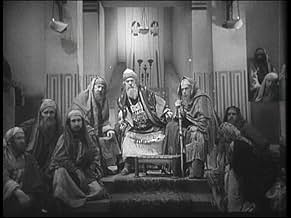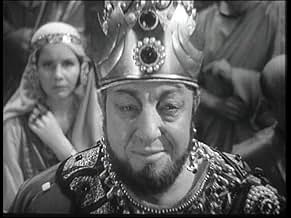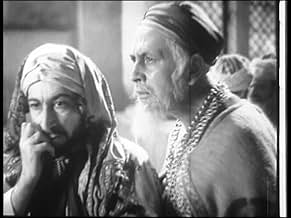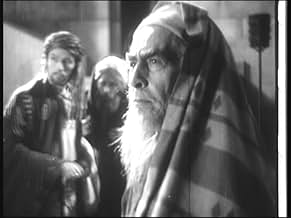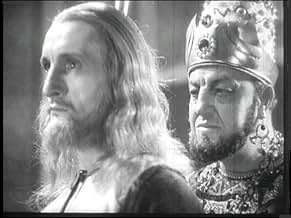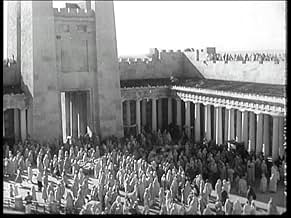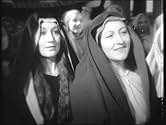Adicionar um enredo no seu idiomaThe final days of Jesus from the time he enters the city of Jerusalem. Viewed as a threat, it is decided that he must be captured, tried, and executed as a criminal, a plan aided and abetted... Ler tudoThe final days of Jesus from the time he enters the city of Jerusalem. Viewed as a threat, it is decided that he must be captured, tried, and executed as a criminal, a plan aided and abetted by disciple Judas Iscariot.The final days of Jesus from the time he enters the city of Jerusalem. Viewed as a threat, it is decided that he must be captured, tried, and executed as a criminal, a plan aided and abetted by disciple Judas Iscariot.
- Prêmios
- 1 vitória no total
André Bacqué
- Anne
- (as Andre Bacque)
Hubert Prélier
- Pierre
- (as Hubert Prelier)
Edmond Van Daële
- Gerson
- (as Van Daele)
Marcel Chabrier
- Joseph d'Arimathie
- (as Chabrier)
Georges Saillard
- Un Sanhédrite
- (as Saillard)
François Viguier
- Un Sanhédrite
- (as Viguier)
Maurice Lagrenée
- Philippe
- (as Maurice Lagrenee)
Avaliações em destaque
Duvivier's story of the Passion is badly thought of in its native country."Ridiculous ,a film that should never have been made,rubbish,you name it".
When today you try to see what is good and what is bad in this movie,this is easy.
What is definitely bad:the choice of the actors.Le Vigan is closer to Rasputin than to Christ.His hoarse voice has nothing to fascinate the crowds and his beard....well if you cannot say something nice..And what about Gabin's Pilate? Gabin's Parisian accent is guaranteed to net nothing but horse -laugh.OK ,Claudia (Edwige Feuillère) tells her hubby he was nurtured in the plebeian milieu,but this is probably the actor's worst part in the golden thirties -shall I have to add that Gabin is THE French actor of that era,if not of the whole French cinema.
But all that remains is splendid indeed and did not deserve such a contempt:the cinematography is wonderful ;two examples :the three crosses ,climbing up the Golgotha ,or Judas 's death ,seen from a distance .Aerial pictures of Jerusalem already display Duvivier's sense of space which will be used to even better effects in his celebrated "Pepe le Moko" .The movements in the crowd compare favorably with the best of the epics of those ancient times such as Fred Niblo's "Ben Hur" (1925).The forty lashes scene ,which the populace intently watches behind the bars ,is not out of place in a Duvivier movie:nobody in France depicted human wickedness like he did.
The political side of the story is not passed over in silence either: Judas's motivations ,at the beck and call of the Sanhedrin ,Herode's scene (Unlike Gabin and Le Vigan, Harry Baur is well cast as the king and however his appearance does not exceed five minutes).
In the end what is good outshines what is bad.
When today you try to see what is good and what is bad in this movie,this is easy.
What is definitely bad:the choice of the actors.Le Vigan is closer to Rasputin than to Christ.His hoarse voice has nothing to fascinate the crowds and his beard....well if you cannot say something nice..And what about Gabin's Pilate? Gabin's Parisian accent is guaranteed to net nothing but horse -laugh.OK ,Claudia (Edwige Feuillère) tells her hubby he was nurtured in the plebeian milieu,but this is probably the actor's worst part in the golden thirties -shall I have to add that Gabin is THE French actor of that era,if not of the whole French cinema.
But all that remains is splendid indeed and did not deserve such a contempt:the cinematography is wonderful ;two examples :the three crosses ,climbing up the Golgotha ,or Judas 's death ,seen from a distance .Aerial pictures of Jerusalem already display Duvivier's sense of space which will be used to even better effects in his celebrated "Pepe le Moko" .The movements in the crowd compare favorably with the best of the epics of those ancient times such as Fred Niblo's "Ben Hur" (1925).The forty lashes scene ,which the populace intently watches behind the bars ,is not out of place in a Duvivier movie:nobody in France depicted human wickedness like he did.
The political side of the story is not passed over in silence either: Judas's motivations ,at the beck and call of the Sanhedrin ,Herode's scene (Unlike Gabin and Le Vigan, Harry Baur is well cast as the king and however his appearance does not exceed five minutes).
In the end what is good outshines what is bad.
Eight years after Cecil B. DeMille's definitive silent film about the life of Christ, The King of Kings, Julien Duvivier brought Jesus back to cinema screens. The difference between the two films, however, is far greater than mere language. The King of Kings typifies the stagey pseudo-piety that has typified most American cinematic Christs, whereas Golgotha like Pasolini's more widely known Il Vangelo Secondo Matteo (Gospel According to Matthew) captures something deeper, mysterious and more spiritual with its simpler feel.
That is not to say that Golgotha has not been done a grand scale. The opening scenes of Jesus's triumphal entry into Jerusalem are as vast as anything Hollywood has had to offer us; but the scene also typifies the difference. Jesus is almost entirely absent from it. Yet, even without subtitles or a knowledge of French it is clear what is happening. Duvivier teases the audience showing the hustle and bustle of the crowd, the Pharisee's discussing what has been going on, the action at a distance, and even a shot of the crowd from Jesus's point of view as he passes through, but delaying showing us Christ himself.
When Jesus (played by Robert Le Vigan) finally does appear, over ten minutes into the film, it is at a distance, and shot from a low angle. He is almost obscured by his disciples, and there is a moment of confusion as to whether this is really he. The effect is to give the viewer the impression of actually being there, and discovering Jesus for the first time.
Inside the temple Duvivier delivers the finest sequence in the entire film, and one of the most memorable scenes in any Jesus film to date, as Jesus drives out the money-changers. The sequence culminates in a single long take, over 30 seconds long which is the most impressive of them all. The camera tracks through the palisades of the temple in Jesus's wake, straining to catch up with him as he zigzags from stall to stall.
Like Jesus Christ Superstar, and to a greater extent the most recent Jesus film - Mel Gibson's The Passion of the Christ - Golgotha returns to the roots of the Jesus film genre and focuses on the immediate events leading up to Jesus's death. Hence the majority of the dialogue focuses on the political machinations both within the Sanhedrin, and between the Jewish leaders and Pilate. The centrepiece of the film is arguably the conversation between Pilate (played by French star Jean Gabin) and Jesus, culminating in the former declaring "Ecce Homo" (behold the man), which was actually the original title for the film.
What is surprising is that despite this being the first Jesus film with sound, Duvivier focuses on these conversations, many of them fictional, and ignores nearly all of Jesus's teaching.
Duvivier emphasises the mystery around Jesus, and as a whole his divinity is presented very well. As noted above this starts with the mystery around his entry into Jerusalem not only the way it is filmed but that the scene where Jesus is hailed as a king forms one of the bookends for the film. It sets the tone of this man being someone special. The vast crowd adds to the effect. Perhaps the most obvious device used is the miraculous events that are included. By restricting itself to the events of Passion Week the screenplay truncates a good source of the accounts of miraculous happenings around the life of Christ. Given how other films have included these and converted them into kitsch set pieces then this may very well be deliberate.
Instead of these grand spectacles Duvivier again presents three beautifully understated events, but invests them with a deep sense of transcendence. Incredibly, the first does not occur right up until Jesus's arrest. Even then Duvivier shuns the more crowd pleasing healing of Malchus's ear in favour of the obscure words of John 18:6. As Jesus identifies himself as the man the soldiers seek he simply says "I am he". John then records that as he did so the soldiers "drew back and fell to the ground" (RSV). Duvivier shows a range of responses, with some soldiers falling, and others remaining upright, but he films it so astonishingly that it somehow captures the truly phenomenal nature of such an event.
One of the flaws with The Passion of the Christ was that it failed to round out the Roman soldiers who sadistically inflicted so much suffering during the films two hours. Despite a shorter run time, Golgotha imparts the relevant scenes with a far greater degree of realism than The Passion, capturing, as it does, the sadism, but also the underlying insecurity, that drives such bullying. Harry Baur's Herod typifies the approach. Herod's ruthless mocking is interspersed by subtler indications that he is desperately trying to gain the approval of his all-too-pliant courtiers.
Duvivier also uses these scenes to commentate on the very real political events of that time. As the soldiers beat and ridicule Christ one of them mockingly salutes him with his arm fully aloft in a manner clearly reminiscent of the fascist and Nazi salutes. Golgotha (dangerously) challenges an ideology in such a way that it embodies the risky and prophetic spirit of its central character.
As with the earlier scene in Gethsemane, Duvivier manages to get the resurrection just right, skilfully combining the early accounts in Luke (the woman at the tomb, and the road to Emmaus) with the later events in John (appearance amongst the disciples, Thomas, and Peter's restoration). There is also something special about the first appearance of the risen Jesus as he materialises in the middle of the upper room. It is simple and effective, yet it also manages to capture the otherness of it.
That is not to say that Golgotha has not been done a grand scale. The opening scenes of Jesus's triumphal entry into Jerusalem are as vast as anything Hollywood has had to offer us; but the scene also typifies the difference. Jesus is almost entirely absent from it. Yet, even without subtitles or a knowledge of French it is clear what is happening. Duvivier teases the audience showing the hustle and bustle of the crowd, the Pharisee's discussing what has been going on, the action at a distance, and even a shot of the crowd from Jesus's point of view as he passes through, but delaying showing us Christ himself.
When Jesus (played by Robert Le Vigan) finally does appear, over ten minutes into the film, it is at a distance, and shot from a low angle. He is almost obscured by his disciples, and there is a moment of confusion as to whether this is really he. The effect is to give the viewer the impression of actually being there, and discovering Jesus for the first time.
Inside the temple Duvivier delivers the finest sequence in the entire film, and one of the most memorable scenes in any Jesus film to date, as Jesus drives out the money-changers. The sequence culminates in a single long take, over 30 seconds long which is the most impressive of them all. The camera tracks through the palisades of the temple in Jesus's wake, straining to catch up with him as he zigzags from stall to stall.
Like Jesus Christ Superstar, and to a greater extent the most recent Jesus film - Mel Gibson's The Passion of the Christ - Golgotha returns to the roots of the Jesus film genre and focuses on the immediate events leading up to Jesus's death. Hence the majority of the dialogue focuses on the political machinations both within the Sanhedrin, and between the Jewish leaders and Pilate. The centrepiece of the film is arguably the conversation between Pilate (played by French star Jean Gabin) and Jesus, culminating in the former declaring "Ecce Homo" (behold the man), which was actually the original title for the film.
What is surprising is that despite this being the first Jesus film with sound, Duvivier focuses on these conversations, many of them fictional, and ignores nearly all of Jesus's teaching.
Duvivier emphasises the mystery around Jesus, and as a whole his divinity is presented very well. As noted above this starts with the mystery around his entry into Jerusalem not only the way it is filmed but that the scene where Jesus is hailed as a king forms one of the bookends for the film. It sets the tone of this man being someone special. The vast crowd adds to the effect. Perhaps the most obvious device used is the miraculous events that are included. By restricting itself to the events of Passion Week the screenplay truncates a good source of the accounts of miraculous happenings around the life of Christ. Given how other films have included these and converted them into kitsch set pieces then this may very well be deliberate.
Instead of these grand spectacles Duvivier again presents three beautifully understated events, but invests them with a deep sense of transcendence. Incredibly, the first does not occur right up until Jesus's arrest. Even then Duvivier shuns the more crowd pleasing healing of Malchus's ear in favour of the obscure words of John 18:6. As Jesus identifies himself as the man the soldiers seek he simply says "I am he". John then records that as he did so the soldiers "drew back and fell to the ground" (RSV). Duvivier shows a range of responses, with some soldiers falling, and others remaining upright, but he films it so astonishingly that it somehow captures the truly phenomenal nature of such an event.
One of the flaws with The Passion of the Christ was that it failed to round out the Roman soldiers who sadistically inflicted so much suffering during the films two hours. Despite a shorter run time, Golgotha imparts the relevant scenes with a far greater degree of realism than The Passion, capturing, as it does, the sadism, but also the underlying insecurity, that drives such bullying. Harry Baur's Herod typifies the approach. Herod's ruthless mocking is interspersed by subtler indications that he is desperately trying to gain the approval of his all-too-pliant courtiers.
Duvivier also uses these scenes to commentate on the very real political events of that time. As the soldiers beat and ridicule Christ one of them mockingly salutes him with his arm fully aloft in a manner clearly reminiscent of the fascist and Nazi salutes. Golgotha (dangerously) challenges an ideology in such a way that it embodies the risky and prophetic spirit of its central character.
As with the earlier scene in Gethsemane, Duvivier manages to get the resurrection just right, skilfully combining the early accounts in Luke (the woman at the tomb, and the road to Emmaus) with the later events in John (appearance amongst the disciples, Thomas, and Peter's restoration). There is also something special about the first appearance of the risen Jesus as he materialises in the middle of the upper room. It is simple and effective, yet it also manages to capture the otherness of it.
You can miss watching this French peplum from 1935 especially directed by Julien Divivier for what it represents at different level, especially to the memory of the French cinema industry. Seeing Jean Gavin as Ponce Pilate or Harry Baur as King Herod is quite something.
The scale of the production is impressive, especially in the humongous crowd scenes and the climactic thunderstorm effects. But the script is just ticking off familiar boxes ✔. Jean Gabin has one of his earliest - and oddest - parts as Pontius Pilate. The actor who played Jesus looked too old for the role in closeups....although an IMDb search confirms he was indeed just 35 at the time. **1/2 out of 4.
This impressively-mounted but curiously little-known French production is notable as the first "Talkie" specifically dealing with the life of Jesus Christ; as far as I know, there has been only one Italian TV screening of it in my neck of the woods
and that happened all the way back in the mid-1980s! Somehow I got the itch to watch it on last year's Good Friday and, requesting it on a particularly providential website that will remain unnamed here, I was soon supplied with first an unsubtitled copy, then another sporting Italian ones and, much later, one bearing English subtitles! Being fluent in Italian, I had no qualms about seizing the second option immediately; actually, the Italian-dubbed print of the film is also included on the copy I acquired and, somewhat amusingly, the Italian subtitles on the original French version – which is how I eventually watched GOLGOTHA on this year's Easter Saturday – are a transcript of that translation (meaning that a few added lines of dialogue in Italian are kept in when there are no French counterparts for them)! The film was apparently first released as ECCE HOMO and that is how it is actually known (as it were) in the English-speaking world, i.e. BEHOLD THE MAN. Distinguished film-maker Julien Duvivier was truly at the top of his game during this finest period in his career that lasted for twenty years (1930-49); his impressively fluid direction here yields any number of striking compositions – right from that remarkably long opening tracking shot over the walls of Jerusalem – which truly elevate the film towards the upper echelons within the Biblical subgenre. Another significant contribution comes via Jacques Ibert's powerful score that is virtually a constant companion to the on screen images (so much so that Ibert is atypically billed right under Duvivier in the opening credits)! Besides, it seems very appropriate that the music makes use of the celebrated elegiac piece "Dies Irae"– given that Duvivier is here clearly under the influence of Carl Theodor Dreyer's revolutionary use of the close-up in his Silent masterpiece THE PASSION OF JOAN OF ARC (1928) and that Dreyer's subsequent spiritual work DAY OF WRATH (1943) was actually retitled DIES IRAE for Italian theatrical distribution purposes! The cast includes several notable names in French cinema: the teaming of Jean Gabin and Edwige Feuilliere, as Pontius Pilate and his wife Claudia respectively, is very different from their subsequent one in Claude Autant-Lara's LOVE IS MY PROFESSION (1958) that I watched earlier this year; Harry Baur's Herod Antipas, then, is initially in awe of his infamous defendant but is eventually disenchanted with Christ's silent defiance. I have purposefully left any comment about the actor playing Jesus Himself for last: Robert Le Vigan's Christ must surely be the most haunted and haunting one ever caught on celluloid (perhaps never more so than when He comes face to face with His heartbroken mother on the way to Golgotha) – could lyricist supremo Tim Rice perhaps have been thinking of his performance when he penned a particular phrase in the song "Pilate's Dream" for the popular Jesus Christ SUPERSTAR rock opera? Duvivier chooses to focus on the final week of Jesus' passage on Earth – from Palm Sunday to just after the Resurrection – but, although Christ's presence permeates every foot of the film (with the Jewish elders conniving against and the commoners exalting Him), the director cleverly withholds His first truly distinct appearance until the 20-minute mark (during the remarkably P.O.V.-shot hubris at the Temple)...but the audience is made to wait a further 6 minutes before we get a bona-fide close-up of the actor playing Him! Also noteworthy is that fact that, for being the first Sound film made about Christ, rather than focus on His teachings we get to experience Him through how others (Caiaphas, Judas Iscariot, Pontius Pilate, Herod Antipas, a fainting spectator at the flagellation, the distraught disciples at Emmaus, etc.) see Him. To get to Le Vigan once more for a minute: although I have watched, or have at my disposal, 10 other films in which he appeared, this is the first time that his presence has impressed itself upon me and, sadly, his off-screen life was as equally tragic as the part he played in GOLGOTHA itself – openly advocating his anti-Semitism and collaborating with the Nazis during their occupation of Paris, he was eventually stripped of his French citizenship and had all his assets confiscated, was imprisoned to ten years' hard labor (of which he served three) until, in late 1972, he ended his days impoverished and insane in Argentina!!
Você sabia?
- CuriosidadesThe first sound film made about the life of Jesus Christ, although it only covers Palm Sunday, the Passion, and the Resurrection.
- Erros de gravaçãoThe Crucifixion scene in the film is totally wrong as the men nailing Jesus to cross are not Roman Soldiers but Jews from the crowd.
- Cenas durante ou pós-créditosThe cast list in the opening credits is read out by an off-screen voice. It lists the actors as follows: Harry Baur, Jean Gabin, Edwige Feuillère, Charles Granval, André Bacqué, Lucas Gridoux, Hubert Prélier, Juliette Verneuil and finally Robert Le Vigan as Jesus.
- Versões alternativasAn abridged version runs about 45 minutes, and omits the entire Last Supper sequence, among other scenes.
- ConexõesFeatured in Jesus Christ, Movie Star (1992)
Principais escolhas
Faça login para avaliar e ver a lista de recomendações personalizadas
Detalhes
- Tempo de duração
- 1 h 35 min(95 min)
- Cor
- Proporção
- 1.37 : 1
Contribua para esta página
Sugerir uma alteração ou adicionar conteúdo ausente

